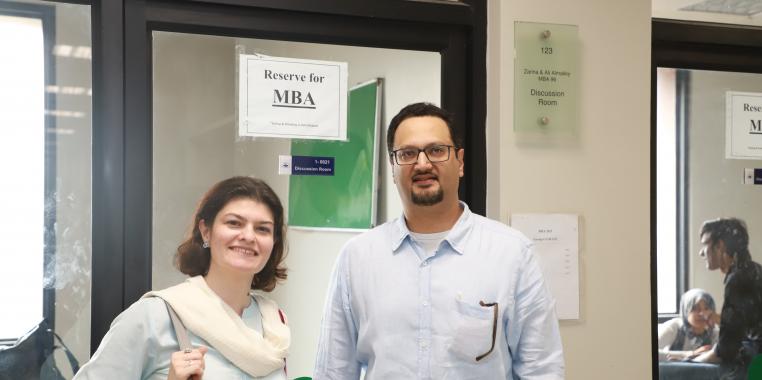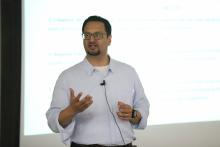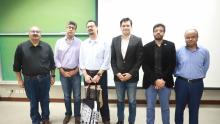
Suleman Dawood School of Business - LUMS, with the support of SDSB Luminites Association, recently organized a conversation for MBA students with SDSB alumnus and Managing Director for JP Morgan’s Global Corporate and Investment Banking Strategy group, Mr. Ali Almakky. The group focuses on organic and inorganic opportunities for the division including assessing prospects for efficiency and improvement.
Prior to his current role, Mr. Almakky was the Global Head of Corporate Strategy at Deutsche Bank based in London between 2015 and 2018, and a member of the Group Investment Committee and the Culture, Integrity and Conduct Counsel for the bank. He also worked at Bank of America Merrill Lynch for 11 years in various roles, including Co-Head of Global Corporate and Investment Banking Strategy in New York, Global Co-COO of FICC Sales in London, and lastly as the Risk COO for Global Banking & Markets in New York. Additionally, He worked as a Director at American Express in the risk management for strategic alliances and JVs area, McKinsey as an Engagement Manager covering Financial Institutions based in New York, and Citibank in Pakistan.
Ali holds an MSc in Finance & Economics from the London School of Economics & Political Science and is an MBA graduate (Batch of 1996) from the Suleman Dawood School of Business – LUMS. The session with Mr. Ali Almakky was inaugurated by Honorary Dean SDSB, Dr. Alnoor Bhimani and Mr. Majid Munir, President SDSB Luminites Association. Mr. Almakky talked about challenges facing the global banking industry and opportunities for adopting emerging technologies. Mr. Almakky shared views on potential scenarios about how the global banking industry could potentially evolve including:
- 1. Banks as utilities: Do global banks become utilities for the industry with limited ownership of their client relationships and get relegated as providers of backend infrastructure to disrupters (fin-techs/other e-commerce platforms and market place ecosystems)?
- 2. Enhanced dis-intermediation: Do the global markets fragment with alternative capital providers (e.g. private equity) eating away at the more potentially profitable/regulated portions of the market?
- 3. Regional fragmentation: Should local players in country/regional markets adapt local business models to leap-frog global business models and create local champions by redefining their financial eco-system?
- 4. Incumbents strike back: Do global banks retain their primacy within the financial services space, absorb new technologies (through partnerships and/or acquisitions), and continue to dominate given the regulatory barriers to entry, their large scale, their global footprints and fully in-house front to back capabilities?
Mr. Almakky added that technology was evolving at such a rapid pace, that new business models were emerging every week; consequently making it harder to regulate FinTech effectively. Instead, he urged a focus on broader principle-based regulation aligned with traditional regulatory objectives.
Responding to questions from the MBA class, Mr. Almakky maintained that the biggest challenge constricting growth of FinTech was not regulation, but the ability to scale business models to achieve profitability. Additionally, the existence of legacy infrastructure was also hampering the ability to create new and more efficient payment chains, lowering growth and adoption. Banking risks and low credit card penetration in markets like Pakistan were also discussed.
Mr. Almakky concluded the session with some nostalgic views about SDSB-LUMS; especially the impact the case method of learning had in his professional life. He further advised MBA students to place integrity above all else as ambassadors of LUMS, and highlighted how this was a non-negotiable requirement in the modern workplace. The event was followed by a networking tea with the faculty and alumni.











